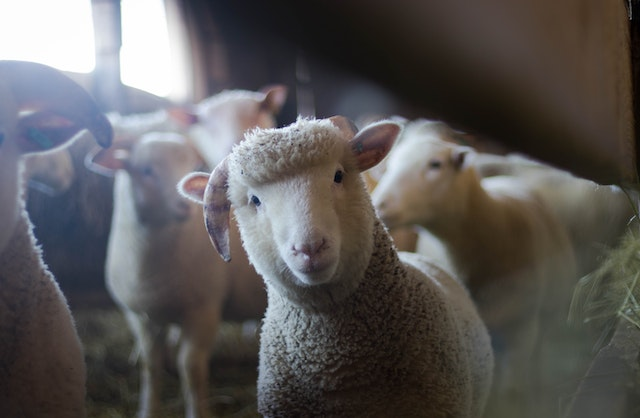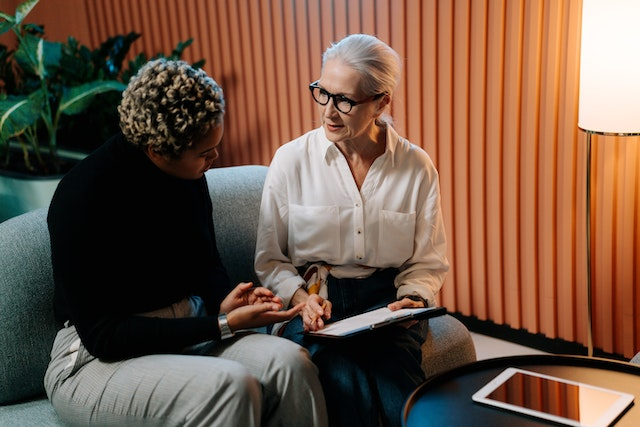Unusual Interview Questions: Can They Help You Make Better Hires?

If You Had to Ask an Unusual Interview Question, How Would You Do It?
As a young and up-and-coming content writer, one of my earliest memories of a job interview was being asked a fairly standard question about an example of a problem I had solved and what my approach was. All fine. Totally normal. After I had nervously waffled my way to a conclusion, the interviewer gave a slight nod before producing a pen and some paper.
“Now draw a sheep solving the problem you just described,” he said, his face betraying no understanding of the absurdity of the task he had just requested.
I think about this often, when I’m walking the dog or when I can’t sleep; whenever I find myself in rural Wales. What was the significance of the sheep? What was I supposed to do?
At this point, we probably all have a story like this one. A time where we faced some sort of curveball interview question and struggled to know what to say. What was the right answer? What were they hoping to learn?

Right now, as you’re reading this, someone is standing around Trafalgar Square, desperately trying to work out the best way to count all the pigeons, unable to get over the embarrassment of having no good answer when asked about it in an interview.
So, you might be forgiven for thinking what’s the point of these kinds of quirky interview questions? Do they really add anything beyond awkwardness?
Well, another time, many years after the sheep-drawing debacle, I found myself on the other side of an interview, shifting uncomfortably in my seat as my colleague posed that old chestnut: ‘How would you count the pigeons in Trafalgar Square?’’
The candidate, with dead-eyed exactness, described in detail the ways he would poison the pigeon population and then simply count up the corpses.
So, maybe something valuable was learned. He was not offered the job.
The point is, asking ‘can unusual interview questions help make better hires?’ is a bit of a head-scratcher itself. It’s a difficult one to answer, and it’s not particularly clear cut. Let’s try and figure it out together.

If Unusual Interview Questions Could Change the World, How Would You Prove It?
Let’s start with what we know: hiring the right candidates is a critical aspect of building a successful and dynamic team.
Traditional interviews tend to focus on assessing a candidate’s qualifications, experience, and skills, which are undoubtedly crucial factors, but these can also lead to bland, wrote interviews that give hiring managers and recruiters little sense of what a candidate is like as a person. How will this person fit in with our culture? What will they add to the culture? How well do they cope under pressure?
Unfortunately, you don’t know, but you are very clear about their proficiency with Excel.
This is why, more and more, companies have started incorporating unusual interview questions into their hiring process, aiming to gain deeper insights into a candidate’s personality, problem-solving skills, and cultural fit.
If done correctly, an unexpected question can also help break the ice, and help a candidate relax. It can help them come out of their shell and lead to the kind of insightful conversation that gives you a sense of what this person is like, beyond a list of their qualifications and career aspirations.

What is the Role of Strange Interview Questions?
Unusual or weird interview questions deviate from the standard inquiries, prompting candidates to think creatively and display their ability to adapt to unexpected situations.
These questions often do not have a ‘right’ answer, but rather, they offer hiring managers an opportunity to evaluate a candidate’s thought process, communication skills, and emotional intelligence.
So, if you were to ask a candidate, ‘what do you think of garden gnomes?’ or ‘if you could choose one super power, what would it be?’, the goal here is less about the specifics of what a candidate says, and more about how they reached their answer; whether they were even able to deal with an unexpected question like that in the first place, and what it tells you about them.
As I said, these are oddball questions that don’t particularly have right answers, but they can have wrong answers, as proven by the man with maniacal pigeon-culling ambitions above.

What are the Benefits of Unusual Interview Questions?
Assessing Problem-Solving Skills
Unconventional questions challenge candidates to think on their feet and provide insights into how they approach complex problems. Their ability to reason, strategize, and demonstrate creativity can be gauged through their responses.
Evaluating Cultural Fit
Assessing cultural fit is vital for maintaining a cohesive and harmonious work environment. Unusual questions can give hiring managers a glimpse into whether a candidate’s values align with the company’s culture.
Revealing Authenticity
Standard interview questions often elicit rehearsed responses from candidates. However, unusual or unexpected questions can catch them off guard, prompting more authentic and unfiltered reactions, revealing their true selves.
Testing Adaptability
In today’s fast-paced and constantly evolving work environments, adaptability is a crucial trait. Unusual questions can help gauge a candidate’s ability to adapt and thrive in unforeseen circumstances.
Encouraging Diversity and Inclusion
Unconventional questions can offer candidates from diverse backgrounds a level playing field, as they may not have had the same access to education and training as some of their peers, but that doesn’t mean that they aren’t right for the role you are hiring for.

What are the Drawbacks of Unusual Interview Questions?
Lack of Standardisation
A weird interview question might lack the standardised assessment that traditional interview questions have, making it challenging to compare candidates objectively.
Inconsistency in Evaluation
Interviewers might interpret responses differently, leading to subjective evaluations that could hinder fair hiring practices.
Potential Bias
Some unusual questions may unintentionally favour certain personalities or backgrounds, leading to biased hiring decisions.
Irrelevance to Job Requirements
If not carefully chosen, unusual questions might not offer any meaningful insight into a candidate’s ability to perform the job at hand, and could turn the interview into a fun and kooky waste of everyone’s time.

How Would You Go About Achieving the Right Balance in Interviews?
So, as we have seen, these kinds of weird interview questions can be valuable, up to a point.
They can be a worthwhile tool, but if misused, you’re going to wind up with baffled candidates, trying their best to say something valuable about the number of bicycles in Beijing while secretly wondering why they accepted an interview with such a deeply unprofessional organisation. This is the danger with asking funny interview questions: you might just end up looking like a clown.
Utilising these questions requires preparation and thought around when in the interview you will ask them, and what type of question would actually be helpful for that particular candidate.

Here are some definite things to avoid:
- Do not ask anything that could make a person feel uncomfortable
- Do not ask anything inappropriate or that references a candidate’s protected characteristics such as gender, age, ethnicity, race, etc.
- Do not ask strange or silly questions sporadically throughout the interview – this will make the interviewer, and by extension the company, seem disorganised and as though you’re just making it all up as you go.
Here’s how you should handle strange or unusual interview questions:
- Do try to have fun with candidates – levity in an interview is critical for helping to relieve nerves. This will hopefully help a candidate perform better and will reveal more cultural fit factors during the interview
- Do select unusual questions that align with the core competencies required for the role. This will ensure that the responses are relevant to the job and help in the interviewer identifying the right fit.
- Do provide training for your interviewers to prepare them to interpret and evaluate responses consistently and fairly
- Do let the candidate know that you are transitioning from the more serious questions into something more fun, so they have some context for what is about to be asked of them
- Do have a specific purpose in mind with the questions that you ask, whether that’s breaking the ice, seeing how a candidate thinks on their feet, or to reveal their personal or professional interests, so that you have an idea of what is a ‘right’ or ‘wrong answer’
- Do evaluate their responses objectively against that intended purpose
- Do seek regular feedback from interviewers and candidates to refine the effectiveness of the unusual questions you’re asking during the hiring process

What Are Some Examples of Unusual or Weird Interview Questions?
Here are some interesting interview questions to ask candidates:
“If you were a superhero, which one would you be, and how would your powers benefit this company?”
This question reveals the candidate’s creativity, problem solving skills, and how they perceive their strengths in contributing to the company’s success.
“If you could switch roles with anyone else in this company for a day, who would it be and why?”
This question shows the candidate’s understanding of the organisation, their curiosity about different roles, and how they perceive collaboration within the company.
“What’s the most interesting idea or concept you’ve come across in the past year, and how would you apply it to this role?”
This question evaluates the candidate’s passion for learning and staying updated in their field, as well as their ability to translate ideas into practical applications.
“If you were to write a book about your life, what would the title be, and what would the first chapter be about?”
This question offers a glimpse into the candidate’s personal values, ambitions, and self-awareness.

“If you were given an unlimited budget and resources, what project would you love to work on, and how would it impact the company positively?”
This question gauges the candidate’s vision, strategic thinking, and alignment with the company’s long-term goals.
“If you could bring one historical figure back to life to work with in this company, who would it be, and what role would they have?”
This question provides insights into the candidate’s admiration for certain traits and leadership styles and how they envision incorporating those characteristics into their work.
Remember, the goal of these unusual questions is not to stump the candidate but to gain a deeper understanding of their personality, problem-solving skills, and cultural fit within the organisation. It’s essential to follow up with probing questions to understand their thought process and reasoning behind their responses.

One Last Thing: Can Weird Interview Questions Help You Make Better Hires?
Unique interview questions can definitely offer valuable insights into a candidate’s problem-solving abilities, cultural fit, and authenticity. When utilised judiciously in combination with traditional interview questions, they can enhance the hiring process and aid in making better, more informed hires.
You can oversee smoother interviews where you get a sense of who the candidate actually is, rather than simply hearing them recite their skills and experience.
The key lies in carefully selecting questions, ensuring standardised evaluation, and avoiding potential biases.
By striking the right balance, companies and the interviewer can create a more holistic and effective hiring process that leads to building a stronger, more cohesive team.

